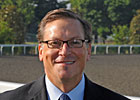(Originally published in the January 15, 2011 issue of The
Blood-Horse magazine. Feel free to share your own thoughts and
opinions at
the bottom of the column.)
By Evan Hammonds

The Thoroughbred industry is recognizing a pair of the sport’s titans this month—and it couldn’t come at a more critical time. These “Twin Pillars” of the Thoroughbred business have devoted most of their lives to the improvement of the industry, and their insights as true originals are vital to making sure the breeding and racing of Thoroughbreds will endure to the next generation.
Marylou Whitney, who has spent much of her life around horses and horse people, has been a successful owner and breeder, and has given generously to many causes in the realm of racing, will be honored with an Eclipse Award of Merit Jan. 17 at the Eclipse Awards in Miami Beach, Fla. Richard Duchossois, a leader in the business since he headed a group that purchased Arlington Park in 1983, was the 79th Honored Guest at the Thoroughbred Club of America Jan. 9 in Lexington.
When they speak, we better listen.
If there is anyone who enjoys a day at the races more than Whitney, we haven’t found her. Known as the “Queen of Saratoga” for her lavish parties and galas and for having a grand time at the racetrack, Whitney continues to carry on the racing success of her late husband, C.V. Whitney, and the Whitney family, which through three generations has bred and raced more stakes winners in North America than anybody else.
Her passion for the Thoroughbred and the people who work in the industry remains as strong and steadfast as ever. Her efforts—through her time and money—to improve the lives of those who work on the backstretch are legendary, as is her steadfast stance on horse slaughter.
“The thing that bothers me most about racing is the people who slaughter horses,” Whitney said from her residence at Cady Hill in Saratoga Springs, N.Y., earlier this month. “These Thoroughbred horses have given us so much. We ought to give back to them everything.
“At the racetrack I’m never unhappy with any of my horses,” she said. “They can’t always win, but when they do win, boy…it’s the best you can do. Many first-time owners get frustrated because they don’t achieve success. However, over the years we’ve learned success as an owner means one thing: that your horse finishes the race unhurt. That’s all.”
Duchossois has already earned an Eclipse Award of Merit, having received his in 2003, the year after Arlington Park hosted the Breeders’ Cup World Championships. The track itself was given an Eclipse in 1985 after it hosted the “Miracle Million” that was run 25 days after fire destroyed the grandstand.
“I’ve had the same job since 1946 (as head of the family-owned Duchossois Group),” said Duchossois last week from his office at Arlington Park. “I’ve been through recessions before. The majority of people today haven’t been through deep recessions and had to scratch for the next buck. You sometimes learn by just having been there.”
In 2000 Arlington Park merged with Churchill Downs, and “Mr. D” has since been a director of Churchill Downs Inc. and the company’s largest shareholder. As a hard-nosed businessman, he continues to battle with the state of Illinois to allow alternative gaming to come to the state’s racetracks. “We can’t continue on the basis we are now without slot machines,” he said. He likes to turn challenges into opportunities and always faces them head-on.
Mr. D. points to night racing at Churchill Downs, innovations at Keeneland, and New Jersey’s experiment with fewer racing dates and larger purses in 2010 as bright spots and advocates creativity to push racing forward.
“We’re going through a struggle of trying to reinvent ourselves,” Duchossois said. “In racing we have to play with the hand that’s dealt us.
“The direction we’re moving in…fewer and fewer tracks are going to survive,” he said. “No tracks are really making money now. The entire amount of dollars bet on pari-mutuel wagering is going to be reduced, but those dollars will be split among fewer tracks. The fewer tracks will get a bigger slice of a smaller pie, but it’s going to be bigger than a thinner slice of the big pie. It’s pure and simple economics.
“The industrial revolution took between 150-200 years before it really took effect on everything,” said Mr. D. “The electronic revolution has taken about 10 years. It’s changed the way we all live and do business, and we’re just at the beginning of it. The industry has changed more in the last 10 years than it had since it started…since George Washington was running horses—and he had a pretty good string.”
Throughout their lives Duchossois and Whitney have never shied away from challenges and are always optimistic at what the future might hold. We should all follow their examples.




